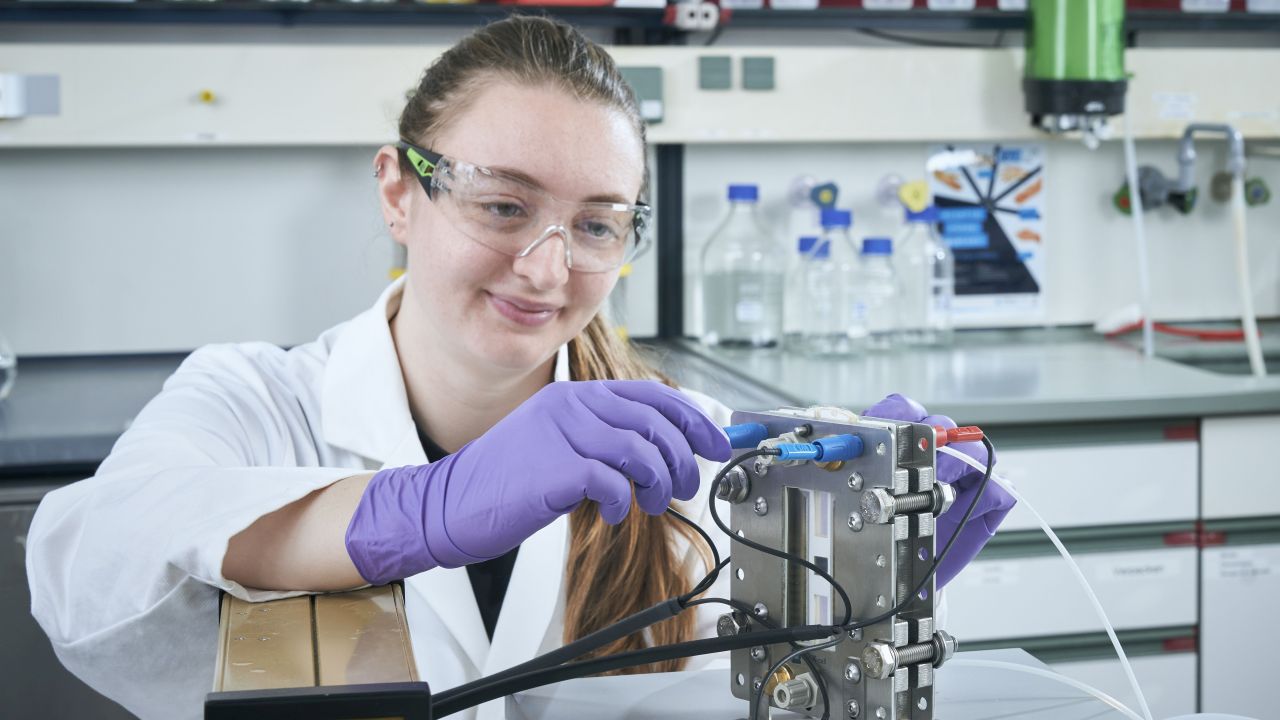
Basic chemicals, which are needed as raw materials for a wide range of products such as medicines and detergents, can currently only be produced with an enormously high input of energy and raw materials. In many cases, fossil fuels and raw materials are still used. The extraction of chemical substances alone requires high temperatures, expensive catalysts made of precious metals and, in some cases, environmentally harmful starting materials. The aim of the ETOS future cluster, which is co-led by the Karlsruhe Institute of Technology (KIT), is to develop more sustainable processes based on electrolysis. Using electricity from renewable energies, they are to create a basis for carbon-neutral chemical production. The German Federal Ministry of Education and Research (BMBF) is funding ETOS as one of seven projects in the Clusters4Future competition.
With special electrolysis processes for the production of fine chemicals, the ETOS future cluster wants to contribute significantly to the defossilization of the chemical industry. "The advantage is that no waste is produced when a reaction is triggered with the help of electricity. It is a 'clean' process, allows mild synthesis conditions, and is inherently safe," says Dr. Philipp Röse from KIT's Institute for Applied Materials - Electrochemical Technologies (IAM-ET). The researchers now want to adapt the electrolysis processes and develop them to industrial scale so that energy and raw materials can be saved. The focus is on the production of fine chemicals, which are basic materials for numerous products. Until now, these could only be produced with sometimes environmentally harmful starting materials, such as oxidants containing heavy metals, at high temperatures, and with expensive catalysts made of precious metals such as palladium or platinum. The team's research is based on organic electrosynthesis, where organic compounds are converted into the desired chemical products by means of an electric current.
"Organic electrosynthesis is still a little-researched niche technology that is rarely used in industry. We now want to use it to develop customized methods for specific production processes that are ecologically and economically worthwhile," says Professor Ulrike Krewer, head of IAM-ET and co-spokesperson of ETOS. "If we then also rely on electricity from renewable sources, the new methods are an important step toward CO2 neutrality in these processes." ETOS will be the first major technology platform to drive the transfer of electroorganic syntheses from the laboratory to industrial scale and, on this basis, develop proposals for solution and key technologies for sustainable, robust, and future-proof processes and products.
Process and Reaction Engineering from Electrodes to Large-scale Demonstrators
The KIT team led by Ulrike Krewer contributes the engineering perspective to the ETOS future cluster. "This involves improving individual components, such as electrodes, as well as entire demonstrators through to the complete process chain in large-scale plants," Röse explains. In ETOS, KIT researchers deal, among other things, with the experimental and model-based analysis and optimization of electrodes and cells and the additive manufacturing of structured reactors. They work on process design as well as on upscaling of processes and evaluation in large-scale plant operation. They are joined by experts in AI-assisted molecular screening. In addition to the IAM-ET, the Institute of Fluid Mechanics, the Institute of Catalysis Research and Technology, the Institute for Micro Process Engineering, the Institute of Organic Chemistry, and the Institute of Biological and Chemical Systems are involved also.
The scientific leadership of ETOS is in the hands of Professor Siegfried Waldvogel at Johannes Gutenberg University Mainz (JGU). There, research focuses on the methods and reaction pathways in organic electrosynthesis, but also on electrolyzers with small electrode spacings, which are intended to enable further increase in the energy efficiency of the cells.
About the ETOS Future Cluster
The future cluster "Electrification of Technical Organic Syntheses" (ETOS) of JGU and KIT is one of seven winners in the "Clusters4Future" competition of the Federal Ministry of Education and Research. Also involved in ETOS are TU Kaiserslautern, TU Darmstadt, Fraunhofer Institute for Microengineering and Microsystems, and 15 industrial partners, including BASF, Boehringer Ingelheim, Merck, Bayer, and Evonik. For the first funding period from 2023 to 2025, ETOS will receive funding of approximately 15 million euros. Industry will contribute an additional approximately five million euros. Subsequently, such funding can be applied for twice more, each time for three additional years, so that ETOS could receive funding of up to 45 million euros for a total of more than nine years.






